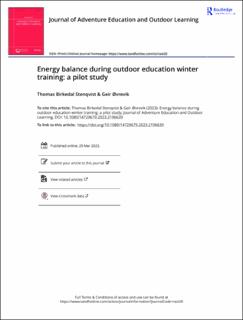Energy balance during outdoor education winter training: a pilot study
Peer reviewed, Journal article
Published version
Permanent lenke
https://hdl.handle.net/11250/3063561Utgivelsesdato
2023Metadata
Vis full innførselSamlinger
Originalversjon
Stenqvist, T. B. & Øvrevik, G. (2023). Energy balance during outdoor education winter training: a pilot study. Journal of Adventure Education and Outdoor Learning, 1-9. doi: 10.1080/14729679.2023.2196639Sammendrag
Learning in the mountains during winter prepares upcoming guides for tough environments by placing demands on their energy intake and enabling them to cope with a complex environment. However, few studies have explored energy intake and expenditure in outdoor education. Thus, energy intake during a 24-hour winter mountain course was investigated in a Norwegian educational context, where students must absorb large volumes of information in a challenging environment. Twenty university students (11 men, 9 women) underwent body composition, weighed energy intake, and accelerometry-based energy expenditure measurements. Overall, the students had an energy deficit of>2,300 kilo-calories/day, corresponding to an energy balance of 62% for men and 54% for women (p > 0.05), despite having received lectures on energy requirements in advance. This sustained stress context combined with challenging environmental conditions and insufficient energy intake can predispose students to early exhaustion, injury risk, and potentially reduced information processing that may limit learning Energy balance during outdoor education winter training: a pilot study

